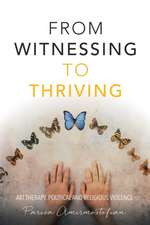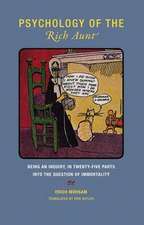Felt Time: The Science of How We Experience Time: The MIT Press
Autor Marc Wittmann, Erik Butleren Limba Engleză Paperback – 13 mar 2017
Din seria The MIT Press
-
 Preț: 155.83 lei
Preț: 155.83 lei -
 Preț: 102.29 lei
Preț: 102.29 lei - 17%
 Preț: 599.95 lei
Preț: 599.95 lei -
 Preț: 238.74 lei
Preț: 238.74 lei -
 Preț: 181.76 lei
Preț: 181.76 lei -
 Preț: 193.63 lei
Preț: 193.63 lei -
 Preț: 286.73 lei
Preț: 286.73 lei - 19%
 Preț: 123.87 lei
Preț: 123.87 lei -
 Preț: 255.60 lei
Preț: 255.60 lei -
 Preț: 252.86 lei
Preț: 252.86 lei -
 Preț: 107.35 lei
Preț: 107.35 lei - 20%
 Preț: 338.96 lei
Preț: 338.96 lei -
 Preț: 362.12 lei
Preț: 362.12 lei -
 Preț: 168.59 lei
Preț: 168.59 lei -
 Preț: 113.45 lei
Preț: 113.45 lei - 16%
 Preț: 1201.04 lei
Preț: 1201.04 lei - 20%
 Preț: 139.66 lei
Preț: 139.66 lei -
 Preț: 331.92 lei
Preț: 331.92 lei - 16%
 Preț: 539.06 lei
Preț: 539.06 lei -
 Preț: 137.51 lei
Preț: 137.51 lei -
 Preț: 229.64 lei
Preț: 229.64 lei -
 Preț: 90.17 lei
Preț: 90.17 lei -
 Preț: 203.42 lei
Preț: 203.42 lei -
 Preț: 250.94 lei
Preț: 250.94 lei -
 Preț: 241.46 lei
Preț: 241.46 lei -
 Preț: 174.42 lei
Preț: 174.42 lei -
 Preț: 152.90 lei
Preț: 152.90 lei -
 Preț: 208.78 lei
Preț: 208.78 lei -
 Preț: 290.08 lei
Preț: 290.08 lei -
 Preț: 366.77 lei
Preț: 366.77 lei -
 Preț: 178.98 lei
Preț: 178.98 lei -
 Preț: 115.25 lei
Preț: 115.25 lei -
 Preț: 128.67 lei
Preț: 128.67 lei - 33%
 Preț: 126.59 lei
Preț: 126.59 lei - 17%
 Preț: 533.17 lei
Preț: 533.17 lei - 14%
 Preț: 437.86 lei
Preț: 437.86 lei -
 Preț: 168.64 lei
Preț: 168.64 lei -
 Preț: 174.50 lei
Preț: 174.50 lei - 20%
 Preț: 336.16 lei
Preț: 336.16 lei - 13%
 Preț: 96.18 lei
Preț: 96.18 lei - 14%
 Preț: 93.51 lei
Preț: 93.51 lei - 13%
 Preț: 120.74 lei
Preț: 120.74 lei - 12%
 Preț: 92.10 lei
Preț: 92.10 lei -
 Preț: 175.43 lei
Preț: 175.43 lei -
 Preț: 329.07 lei
Preț: 329.07 lei - 14%
 Preț: 463.00 lei
Preț: 463.00 lei - 20%
 Preț: 127.07 lei
Preț: 127.07 lei - 20%
 Preț: 151.21 lei
Preț: 151.21 lei - 12%
 Preț: 523.07 lei
Preț: 523.07 lei - 20%
 Preț: 284.80 lei
Preț: 284.80 lei
Preț: 91.72 lei
Preț vechi: 107.37 lei
-15% Nou
17.56€ • 19.08$ • 14.76£
Carte disponibilă
Livrare economică 31 martie-07 aprilie
Livrare express 14-20 martie pentru 33.10 lei
Specificații
ISBN-10: 0262533545
Pagini: 184
Dimensiuni: 143 x 200 x 12 mm
Greutate: 0.18 kg
Editura: Mit Press
Seria The MIT Press
Notă biografică
Marc Wittmann is a Research Fellow at the Institute for Frontier Areas of Psychology and Mental Health, Freiburg, Germany.
Descriere
We have widely varying perceptions of time. Children have trouble waiting for anything. ("Are we there yet?") Boredom is often connected to our sense of time passing (or not passing). As people grow older, time seems to speed up, the years flitting by without a pause. How does our sense of time come about? In Felt Time, Marc Wittmann explores the riddle of subjective time, explaining our perception of time -- whether moment by moment, or in terms of life as a whole. Drawing on the latest insights from psychology and neuroscience, Wittmann offers a new answer to the question of how we experience time. Wittmann explains, among other things, how we choose between savoring the moment and deferring gratification; why impulsive people are bored easily, and why their boredom is often a matter of time; whether each person possesses a personal speed, a particular brain rhythm distinguishing quick people from slow people; and why the feeling of duration can serve as an "error signal," letting us know when it is taking too long for dinner to be ready or for the bus to come. He considers the practice of mindfulness, and whether it can reduce the speed of life and help us gain more time, and he describes how, as we grow older, subjective time accelerates as routine increases; a fulfilled and varied life is a long life. Evidence shows that bodily processes -- especially the heartbeat -- underlie our feeling of time and act as an internal clock for our sense of time. And Wittmann points to recent research that connects time to consciousness; ongoing studies of time consciousness, he tells us, will help us to understand the conscious self.













